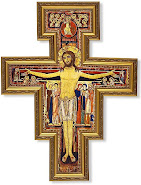 It's a story familiar to all of us. The tale of a virgin giving birth, a child laid in a manger and shepherds greeted by angels. But what if we had never heard the story before? Lets place ourselves as first century Jews who are hearing this plot for the first time. Were the events prior to Christ's birth a fulfillment of what had been prophesized for centuries? Let's all try and go back into the first century Jewish world so as to discover many of the spiritual treasures by looking more deeply into the mystery of Christ's coming in Scripture.
It's a story familiar to all of us. The tale of a virgin giving birth, a child laid in a manger and shepherds greeted by angels. But what if we had never heard the story before? Lets place ourselves as first century Jews who are hearing this plot for the first time. Were the events prior to Christ's birth a fulfillment of what had been prophesized for centuries? Let's all try and go back into the first century Jewish world so as to discover many of the spiritual treasures by looking more deeply into the mystery of Christ's coming in Scripture.
Daniel 9: 20-23
20 While I was speaking and praying, confessing my sin and the sin of my people Israel, and presenting my supplication before the LORD my God for the holy hill of my God; 21 while I was speaking in prayer, the man Gabriel, whom I had seen in the vision at the first, came to me in swift flight at the time of the evening sacrifice. 22 He came and he said to me, "O Daniel, I have now come out to give you wisdom and understanding. 23 At the beginning of your supplications a word went forth, and I have come to tell it to you, for you are greatly beloved; therefore consider the word and understand the vision. "
24 "Seventy weeks of years are decreed concerning your people and your holy city, to finish the transgression, to put an end to sin, and to atone for iniquity, to bring in everlasting righteousness, to seal both vision and prophet, and to anoint a most holy place."
Malachi 3:1
BEHOLD, I send my messenger to prepare the way before me, and the Lord whom you seek will suddenly come to his temple; the messenger of the covenant in whom you delight, behold, he is coming, says the LORD of hosts
Luke 1:8-23
8 Now while he was serving as priest before God when his division was on duty, 9 according to the custom of the priesthood, it fell to him by lot to enter the temple of the Lord and burn incense. 10 And the whole multitude of the people were praying outside at the hour of incense. 11 And there appeared to him an angel of the Lord standing on the right side of the altar of incense. 12 And Zechariah was troubled when he saw him, and fear fell upon him. 13 But the angel said to him, "Do not be afraid, Zechariah, for your prayer is heard, and your wife Elizabeth will bear you a son, and you shall call his name John. 14 And you will have joy and gladness, and many will rejoice at his birth; 15 for he will be great before the Lord, and he shall drink no wine nor strong drink, and he will be filled with the Holy Spirit, even from his mother's womb. 16 And he will turn many of the sons of Israel to the Lord their God, 17 and he will go before him in the spirit and power of Elijah, to turn the hearts of the fathers to the children, and the disobedient to the wisdom of the just, to make ready for the Lord a people prepared." 18 And Zechariah said to the angel, "How shall I know this? For I am an old man, and my wife is advanced in years." 19 And the angel answered him, "I am Gabriel, who stand in the presence of God; and I was sent to speak to you, and to bring you this good news. 20 And behold, you will be silent and unable to speak until the day that these things come to pass, because you did not believe my words, which will be fulfilled in their time." 21 And the people were waiting for Zechariah, and they wondered at his delay in the temple. 22 And when he came out, he could not speak to them, and they perceived that he had seen a vision in the temple; and he made signs to them and remained dumb. 23 And when his time of service was ended, he went to his home.
[1] Edward Sri. Dawn of the Messiah. Servant Books. Chapter 1.
 In today's first reading, St. Paul walks into the synagague and gives the Isrealites and all of us a short birds eye view of salvation history. I thought I'd share this today because its not only an amazing journey, but a reminder of how Our Father keeps His promises. And for a great study and adventure through salvation history, there no other book I can recommend, than Scott Hahn's "A Father Who Keeps His Promises"
In today's first reading, St. Paul walks into the synagague and gives the Isrealites and all of us a short birds eye view of salvation history. I thought I'd share this today because its not only an amazing journey, but a reminder of how Our Father keeps His promises. And for a great study and adventure through salvation history, there no other book I can recommend, than Scott Hahn's "A Father Who Keeps His Promises"




















